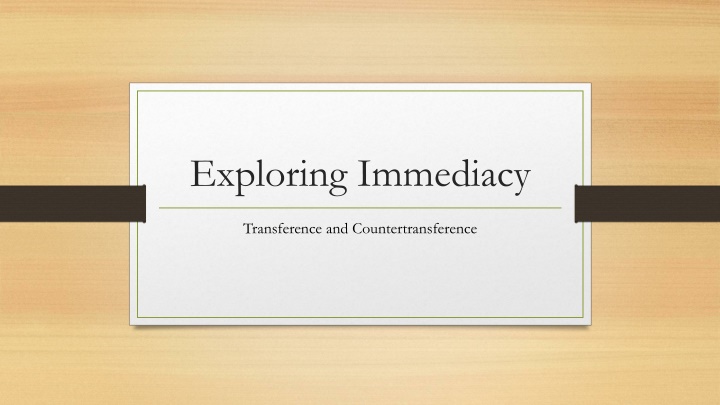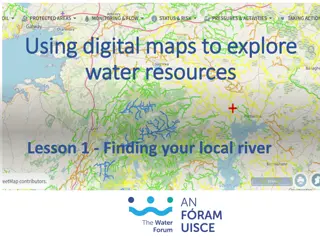
Immediacy, Transference, and Countertransference in Therapy
Explore the significance of immediacy, transference, and countertransference in therapy, focusing on clients projecting unresolved relationships onto therapists, cues for exploration, and questions for therapists to deepen understanding and effectiveness in therapeutic relationships.
Download Presentation

Please find below an Image/Link to download the presentation.
The content on the website is provided AS IS for your information and personal use only. It may not be sold, licensed, or shared on other websites without obtaining consent from the author. If you encounter any issues during the download, it is possible that the publisher has removed the file from their server.
You are allowed to download the files provided on this website for personal or commercial use, subject to the condition that they are used lawfully. All files are the property of their respective owners.
The content on the website is provided AS IS for your information and personal use only. It may not be sold, licensed, or shared on other websites without obtaining consent from the author.
E N D
Presentation Transcript
Exploring Immediacy Transference and Countertransference
Immediacy Exploring Transference: clients projection of unresolved significant relationships onto the therapeutic relationship Why? Psychological attempt to resolve issues related to important relationships A working through of unresolved patterns of relating Recapitulation of significant relationships that remain unresolved Source of unresolved pain, rejection, or loss
Exploring Transference Therapy focuses on the relationship between client and therapist Therapist will address observations about the client s feelings/attitude towards therapist Client will confront feeling towards therapist Exploring the Process Exploring the metacommunication The here and now of therapy
Cues for Exploration Client Indicators: Client attitude towards therapist suddenly changes Angry, subdued, too friendly, vague, unusually talkative Client makes allusions to you ( no one understands me ; I disappoint everyone Client confronts therapist with accusation: I m not getting anything out of therapy ; you like your other clients more
Cues for Exploration Therapist Indicators: Boredom, angry, stuck, disinterested, distracted Sexual Attraction Avoidant or afraid Not using effective skills in therapy
Questions for Therapist What do I feel when I am with this client? What keeps me from being effective with this client? How does this client affect me compared to other clients? What about his client triggers my personal issues? What does the client contribute to the relationship that creates boredom, rejection, repulsion, exhaustion?
Questions for Therapist What about client s reaction to me is important to their interpersonal dynamic with people in their lives? Is interpreting the transference helpful to explaining client s difficulties? How do the feelings/thoughts I am having about the client help inform me about the client s interpersonal dynamic? Do others feel this way with the client? Is that meaningful insight?
Example of Working with Transference Cindy is seeing a female therapist at a college counseling center. She describes being raised by a single mother in subsidized housing complex in Detroit, MI. She recalled hardly seeing her mother for most of her childhood. She states that her mother worked multiple jobs, mostly overnight, and often had to feed herself and home alone overnight. She said neighbors came to know her and would check on her on occasion. Eventually, she states that her mother befriended a older male neighbor who would offer to buy groceries and would often stay with her when her mother had to work overnight. She states that she would wake up in the morning often to find the man in bed with her nude. She eventually told her mother who stopped asking the man for help. She recalls having night terrors, difficulty sleeping, and anxiety at night for years after. She is seeking therapy to address a resurgence of anxiety, with school phobia and difficulty sleeping. She attends 7 sessions and spends the session talking about her concerns about her mother s health. She also apologizes to therapist for not being a better client. What is the transference? Is it meaningful to interpret the transference? How would you approach discussing transference with Cindy? What are potential pitfalls? What countertransference is a female therapist likely to feel? Male therapist?
Mock Session: Working Through Transference Instructions for clients (while therapists out of class) Instructions for Therapist: Nancy presents with depression and narcissistic personality traits. She struggles with deep seeded feelings of inadequacy and superficial grandiosity. She forges relationships well, but overtime will develop hostility and feelings of victimization in her friendships. She often will distort people s actions to create feelings of victimization. Conduct a session acting out the recommended scenario Therapist goal is to address whether interpreting the transference lends insight into client s interpersonal dynamic Therapist: Address transference with client. Interpret Transference with client.






















